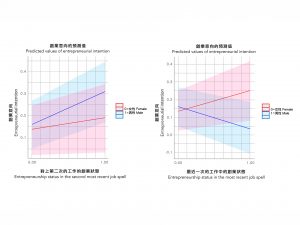More than half of start-ups worldwide fail, and up to 85 per cent of entrepreneurs return to wage employment. Meanwhile, organisations around the world are facing a growing talent shortfall, making it more important than ever to tap into previously neglected labour pools. Former entrepreneurs stand out as a valuable talent source, with their creativity and entrepreneurial skills potentially critical to maintaining organisations’ competitive advantages in today’s innovation-driven business environment.
Entrepreneurial experience and turnover intention
Despite the potential value that former entrepreneurs bring to organisations, recruiters often overlook them, believing it is difficult to retain them in wage employment. In our recent research, we challenged the prevailing stereotype that recruiters hold against former entrepreneurs. We followed a temporal perspective and proposed that not all prior entrepreneurs are more likely to quit. Specifically, employees with recent entrepreneurial experience (i.e., their last job was running their own business) would be less likely to have entrepreneurial intentions and thus demonstrate lower turnover intentions and a reduced likelihood of quitting their wage jobs compared with employees without entrepreneurial experience. Moreover, the serial mediation effect would be stronger for men than women.
To examine our hypotheses, we derived a sample of 12,606 wage job spells from the nationally representative Household, Income, and Labour Dynamics in Australia (HILDA) Survey dataset, spanning from 2001 to 2020. Our findings supported our hypotheses that the timing of prior entrepreneurial experience matters in predicting post-entrepreneurship employment intention to leave and actual turnover.
Specifically, individuals with recent entrepreneurial experience were no more likely to develop subsequent entrepreneurial intentions and, consequently, quit their wage jobs than those without recent entrepreneurial experience. Moreover, we found important gender differences: men, but not women, with entrepreneurial experience in their most recent job spell tend to show lower levels of subsequent entrepreneurial intention and a lower likelihood of voluntary turnover compared to men without recent entrepreneurial experience. In addition, although natural clock time (e.g., years, days, hours) is more commonly used when considering individual work and life experiences in general, we found that neither the duration in nor the duration away from entrepreneurship was a significant predictor of subsequent entrepreneurial intention, turnover intention, and voluntary turnover.
Timing and gender differences in entrepreneurial experience
In the research, we adopted a temporal perspective to conceptualise prior entrepreneurial experience. Our findings provide three novel insights and implications for practice. First, our findings challenge the prevailing stereotype that all entrepreneurs are risky quitters in wage employment. They highlight the importance of the timing of entrepreneurial experience in predicting former entrepreneurs’ post-entrepreneurship employment attitudes (e.g., entrepreneurial intention, turnover intention) and behaviour (voluntary turnover). Hiring former entrepreneurs, especially those who have recently quit entrepreneurship, could benefit organisations by bringing in fresh entrepreneurial skills without the potentially high cost associated with turnover.
Second, our findings suggest that former entrepreneurs need time to recover financially and emotionally from their previous entrepreneurial exit before they are ready to re-enter entrepreneurship. Former entrepreneurs, especially those who failed, may benefit from giving themselves time by taking up a wage job to recover from their past entrepreneurial experience. Doing so may help them distance themselves from previous setbacks and reset themselves for future entrepreneurial goals, leading to better outcomes in their next entrepreneurial attempt.
Third, our findings suggest a novel advantage for women: after exiting entrepreneurship, female entrepreneurs, unlike their male counterparts, do not significantly reduce their entrepreneurial intentions. The disadvantages female entrepreneurs face at the earlier stages of entrepreneurship may have paradoxically shielded them from the liability of entrepreneurial failure or exit. Policymakers and investors may consider providing female entrepreneurs sufficient opportunities (e.g., policies, training) to promote and support their entrepreneurial attempts right after they exit entrepreneurship. In contrast, male entrepreneurs tend to experience a temporary dip in entrepreneurial intention after leaving entrepreneurship. Policymakers and investors may consider providing former male entrepreneurs with resources (e.g., psychological support) and time to help them recover from their entrepreneurship exit and to encourage future entrepreneurial attempts.
Breaking the stereotype
Overall, we examined whether, when, and which entrepreneurial experience influences voluntary turnover in subsequent wage employment. Our findings challenge the prevailing hiring stereotype that all former entrepreneurs pose a high risk of quitting. Recruiters holding this stereotype may prematurely exclude former entrepreneurs from consideration.
Author:
Zhang Liwen is an assistant professor in the Faculty of Business Administration at the University of Macau. She obtained her PhD in organisational behaviour and human resources from Florida State University. Her research focuses on how organisations attract and select potentially qualified job candidates and further retain them after hiring. Her papers have been published in prestigious journals, including the Journal of Applied Psychology and Personnel Psychology. She was awarded the 2014 Scholarly Achievement Impact Award by the Human Resources Division of the Academy of Management.
Text & Photo / Zhang Liwen
Chinese Translation / Davis Ip
Source: UMagazine ISSUE 30


